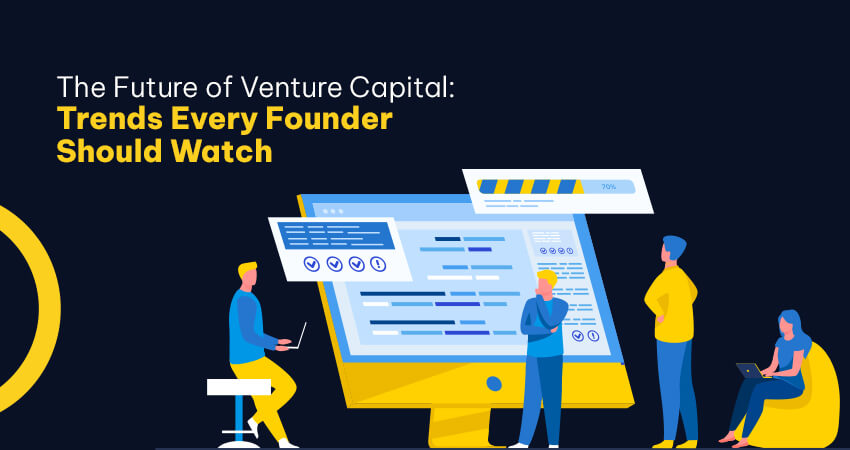
The Future of Venture Capital: Trends Every Founder Should Watch
Venture Capital has historically been instrumental in fostering innovation and allowing new startups to scale innovative concepts that lead to industry-wide changes across various sectors. Silicon Valley’s tech booms and the burgeoning Indian, African, and Latin American startup ecosystems are just some examples from the past few decades showing the drastic evolution of venture capital.
But now we are witnessing the start of a new era, and it’s unlike anything we’ve experienced in the past.
Today’s founders and Venture Capital firms must contend with globalization and economic uncertainty, ever-changing consumer expectations, and a growing focus on social impact, diversity, and sustainability. As we enter deeper into 2025 and onwards, Venture Capital is expected to undergo a change that may redefine funding, scaling, and support models for structuring startups.
If you are a first-time founder or an experienced entrepreneur, adapting to these changes will be imperative if you aim to take advantage of the prevailing conditions.
1. The Emergence of Specialized and Micro VCs
The rule of all-encompassing, generic Venture Capital (VC) firms is a thing of the past. Specialized micro VCs and niche sector-specific funds targeting markets such as climate tech, femtech, deep tech, and creator economy startups are emerging at an unprecedented rate.
Why this matters:
Now, founders have the opportunity to meet investors who will not only provide funding but also possess valuable knowledge and relevant connections. This is transformational to startups looking for tactical mentorship, a quicker product-market fit, and relevant business connections.
Key takeaway:
As a founder, pursue venture capitalists that fit your market and company goals. Focused venture capitalists are more likely to relate to your business’s journey and support your sustained expansion.
2. Investment Decisions Powered by AI Algorithms
Venture Capitalists’ methods are changing with the introduction of Artificial Intelligence technology, which aids in deal sourcing and even predicting the success of startups. This comes as an increase in funds using data AI tools to evaluate founder credentials, market indicators, financial frameworks, and social media presence.
Example:
There are VC firms that have adopted AI technologies to track promising startups even before they start to raise funds. Others utilize real-time data through models to evaluate startups’ risks and likelihood of success.
Why this matters:
While compelling narratives and warm connections still play an important role, information-based validation is gaining equal footing.
Key takeaway:
Make sure that the documents detailing your digital footprint, traction benchmarks, and customer evaluations are airtight because AI algorithms could be monitoring them.
3. Founders Are Becoming Increasingly Empowered
In the last couple of years, the founder versus investor relationship has evolved. Nowadays, founders have access to alternative funding methods such as revenue-based financing, crowdfunding, and other self-funding tools. Therefore, they are no longer restricted by the traditional VC playbook.
Emerging trend:
To access top entrepreneurs, more funds are offering non-dilutive capital and operational support. Additionally, there is a greater importance being given to the mental health & well-being of founders. Some Venture Capital firms provide therapy stipends and coaching services to entrepreneurs.
Key takeaway:
Do not compromise and aim higher. The shift is toward you. Make the decision to collaborate with investors who align with your vision, value system, and leadership style.
4. The Revolution of ESG and Impact Investing
Environmental, social, and governance (ESG) factors are moving from being mere speaking points on corporate culture to becoming mandates for VC firms. Today, there is a great deal of venture capital for impact-driven startups ranging from clean energy to civil inclusive finance.
Data Point:
Impact VC funding exceeded $80 billion in 2024, with climate technology receiving the most funding, as per PitchBook.
What does this mean for you?
If your startup addresses identifiable challenges and delivers a tangible positive change, you face no challenges in obtaining funds from mission-oriented investors.
Key takeaway:
Make your mission matter. There is an active search for businesses that support profit while using purpose, meaning investors are seeing the value in what they invest in.
5. Globalization of Venture Capital (VC)
Today, VC or Venture Capital is not limited to Silicon Valley. It is evident that new startups or “unicorns” are emerging in unexpected places such as New Delhi, Lagos, Tel Aviv, São Paulo, and Jakarta. These places are witnessing unprecedented developmental activities.
Why this shift:
Global talent can be found everywhere. With the availability of the Internet, the playing field is leveled. Remote-first companies have made location irrelevant.
These shifts are making Venture Capital (VC) firms sit up and take notice. Numerous firms are opening regional offices, partnering with local accelerators, and even launching international funds that are geared towards emerging target markets.
Key Takeaway:
Capital can easily be accessed from VC funds no matter where one is located. However, firms need to provide evidence of ambition, scalable technology, and insight that is relevant to the local market.
6. More Hands-On, Platform-Led Venture Capitalist
Numerous venture capital firms tend to evolve into platform organizations. These firms provide and include:
- Talent recruitment
- Go-to-market strategies
- Strategic partnerships
- In-house design, marketing, advertising, and other related services
A good number of VC firms have developed entire ecosystems that assist portfolio companies through every developmental phase, from the growth stage to the initial public offering (IPO), spanning from Andreessen Horowitz to Sequoia Capital.
Why it matters:
In an intensely competitive market, he who adds extra value, other than mere funds, is considered more preferred.
Key Takeaway:
Evaluate a venture fund not only based on a term sheet, but also assess their platform alongside the other services rendered after an investment.
7. Diversity Is No Longer Optional
These days, investing in women entrepreneurs, underrepresented communities, minorities, LGBTQIA+, and generally formerly excluded regional demographics is heating up.
VC firms have started this trend not only because it is the right thing to do, but consecutive funding cycles have proven that it is profitable as well.
Progress snapshot:
- Female-led funds are gaining ground.
- LPs (limited partners), before committing capital, are increasingly questioning portfolio diversity.
- Incentives are being offered by governments to fund underrepresented groups.
Key Takeaway:
Unleash your distinctive ideas since unique perspectives are pursuing diverse identities and constructing ideologies with unprecedented levels of funding.
8. AI, Web3, and BioTech: The Hot Frontiers
While SaaS and fintech continue to dominate the funding landscape, Venture Capital firms are increasingly placing bets on next-gen industries like:
- AI-native startups
- Neurotechnology and brain-computer interfaces
- Sustainable biotech and agritech
- Decentralized infrastructure (Web3)
If you are building in these areas, there is a strong appetite for early-stage investments, particularly for companies that possess advanced intellectual property and innovative technologies.
Key takeaway:
Stay alert for new technologies. The next cohort of unicorns will come from frontier categories that tackle the issues of the future.
Final Thoughts: What This Means for Founders
It’s no longer just capital that fuels the future of Venture Capital. It’s no longer just about raising capital — as a founder, it’s about building networks, earning belief, and creating with purpose. The game is changing, and so must you.
The entrepreneurs who adapt will not just survive — they’ll set the pace for the future.
What You Need To Do:
- Stay updated.
- Network exponentially.
- Match with optimal supporters; do not fixate on the wealthy ones.
- Protect your business fundamentals.


